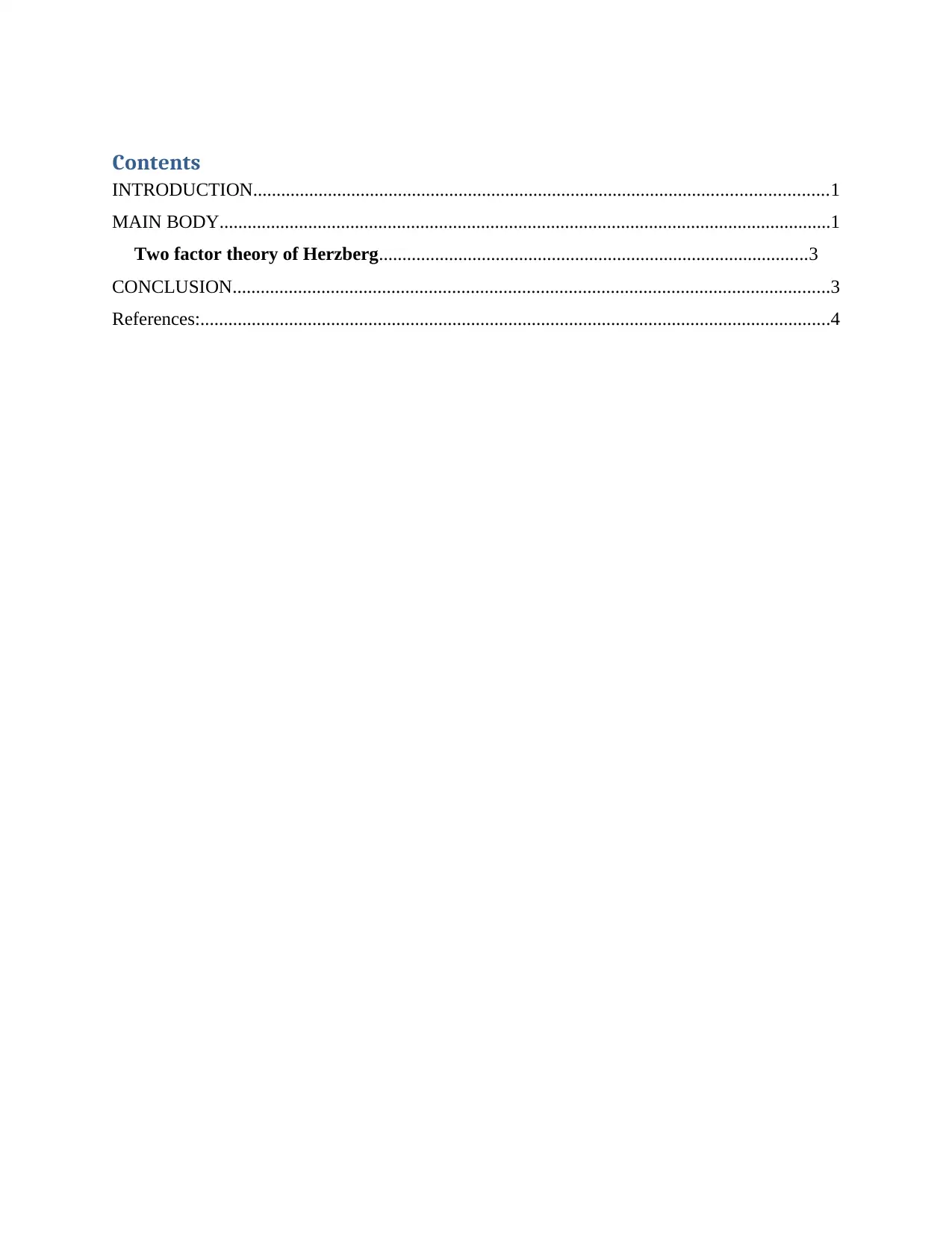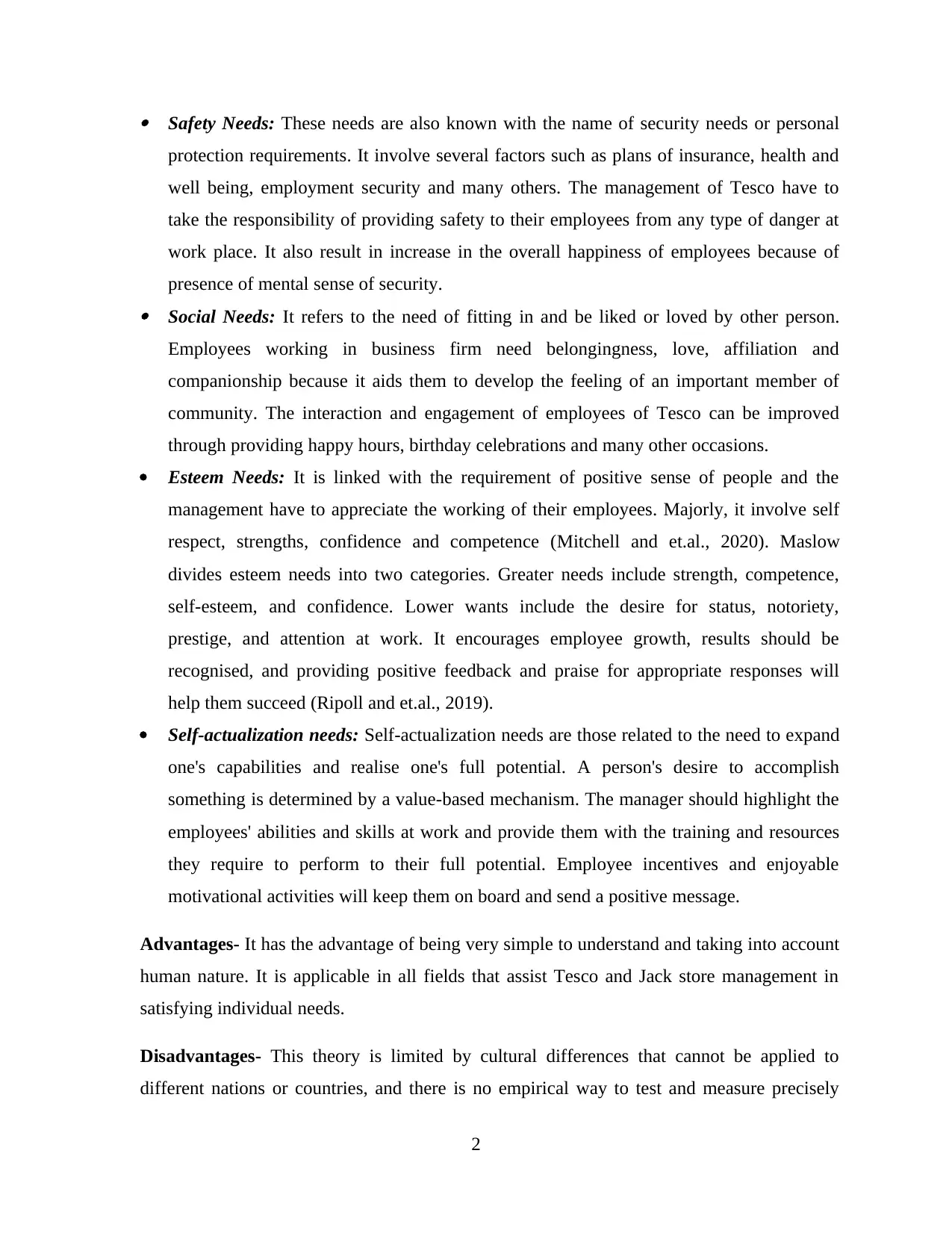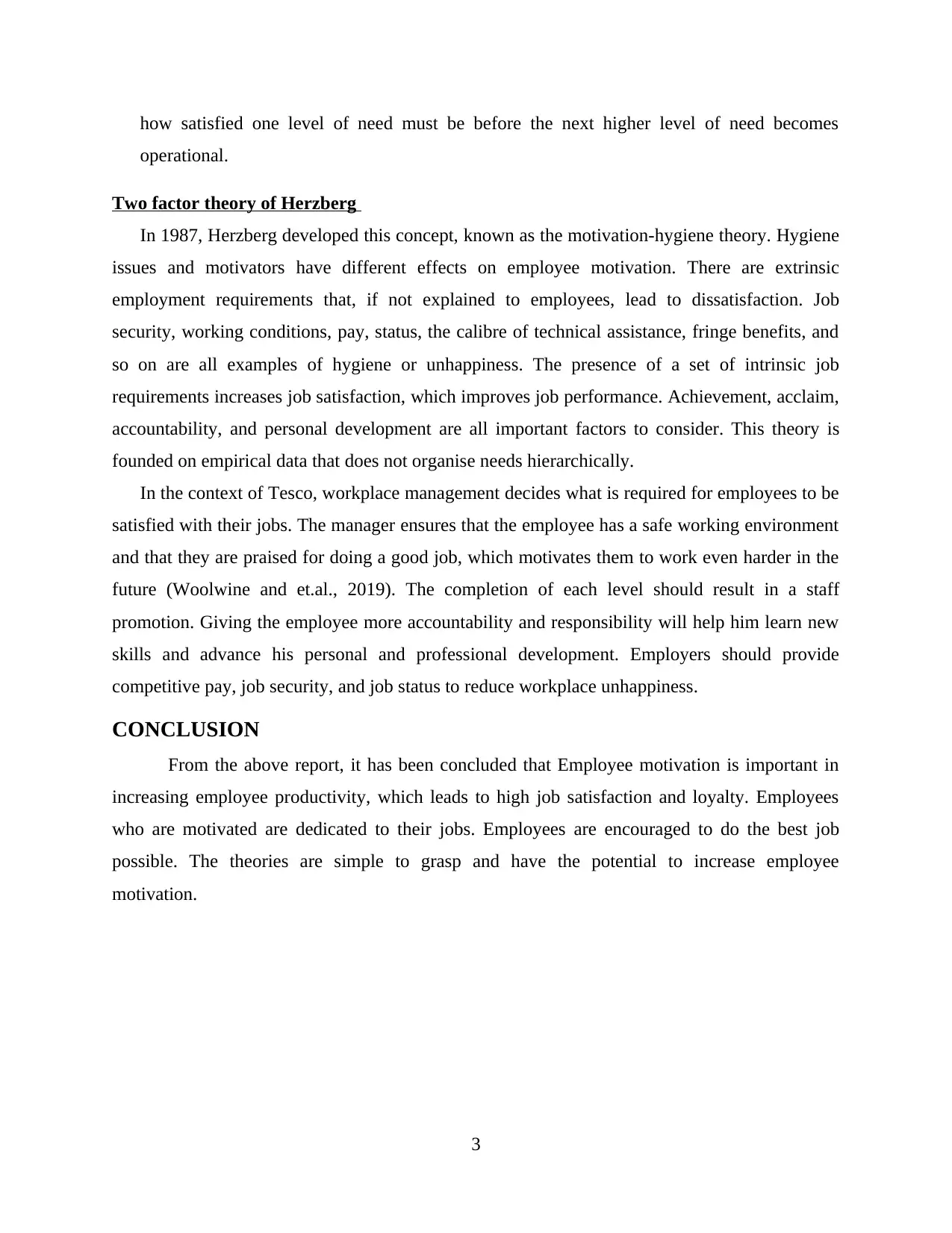Motivation Theories Report: Jack Stores and Tesco's Discount Strategy
VerifiedAdded on 2023/06/08
|6
|1313
|233
Report
AI Summary
This report examines the application of motivation theories within Jack Stores, Tesco's discount retail strategy aimed at competing with Aldi and Lidl. It delves into Maslow's hierarchy of needs, outlining physiological, safety, social, esteem, and self-actualization needs and their relevance to employee motivation in the context of Jack Stores. The report further explores Herzberg's two-factor theory, differentiating between hygiene factors that prevent dissatisfaction and motivators that drive job satisfaction. The analysis considers the advantages and disadvantages of these theories in the specific context of Tesco's Jack Stores, emphasizing the importance of employee motivation for increased productivity, job satisfaction, and loyalty. Concluding that motivated employees are essential for achieving optimal performance and organizational goals, it highlights the simplicity and potential of these theories to enhance employee engagement.

TASK 3
Paraphrase This Document
Need a fresh take? Get an instant paraphrase of this document with our AI Paraphraser

Contents
INTRODUCTION...........................................................................................................................1
MAIN BODY...................................................................................................................................1
Two factor theory of Herzberg............................................................................................3
CONCLUSION................................................................................................................................3
References:.......................................................................................................................................4
INTRODUCTION...........................................................................................................................1
MAIN BODY...................................................................................................................................1
Two factor theory of Herzberg............................................................................................3
CONCLUSION................................................................................................................................3
References:.......................................................................................................................................4

INTRODUCTION
Motivation is defined as the procedure which is being followed by the management of
business organisation which aids to provide guidance to the employees in order to maintaining
the goal oriented behaviour at work place. The respective term is being derived from the term
motive which denote the personal needs and wants of employees. It influence the employees to
perform actions, so that the desired goals and objectives can be attained in an effective and
efficient manner (Rahimi-Golkhandan and et.al., 2017). This report is based on the case study of
motivational techniques at Jack Stores of Tesco announced as to open new discount store as to
compete against Aldi and Lidl. This report include various motivational theories for Jack
discount stores and satisfy the management of Tesco with its advantages and disadvantages.
MAIN BODY
Motivation theories are defined as the concepts or studies which help the management of
business organisation to get the proper work done by their employees to attain desired goals.
Content and process are two types of motivational theories. Below mentioned are the brief
description of motivation theories in the context of jack discount store:
Maslow's theory of Hierarchical needs
This theory was introduced by Abraham Maslow under which he state that the people can
motivate by fulfilling their needs. All the requirements of human being are classified in
hierarchical order which mover from lower to higher order. Below mentioned are the several
needs which are being included in this theory and aids to satisfy the management of Tesco and
Jack discount stores. Physiological needs: It refers to the fundamental needs of human which are essential for
their survival. Majorly, it include food, cloths shelter, air, water and many more. After
satisfying these basic needs, the humans are able to operate their mind and body and
motivate them to enhance their skills and knowledge which leads to their development in
future (Campbell, 2018). The physiological requirements of people working in the
organisation, can be fulfilled through adopting the provision related to snacks, water and
tea at work place. It is also crucial for the management to provide clean and safe working
environment to their employees.
1
Motivation is defined as the procedure which is being followed by the management of
business organisation which aids to provide guidance to the employees in order to maintaining
the goal oriented behaviour at work place. The respective term is being derived from the term
motive which denote the personal needs and wants of employees. It influence the employees to
perform actions, so that the desired goals and objectives can be attained in an effective and
efficient manner (Rahimi-Golkhandan and et.al., 2017). This report is based on the case study of
motivational techniques at Jack Stores of Tesco announced as to open new discount store as to
compete against Aldi and Lidl. This report include various motivational theories for Jack
discount stores and satisfy the management of Tesco with its advantages and disadvantages.
MAIN BODY
Motivation theories are defined as the concepts or studies which help the management of
business organisation to get the proper work done by their employees to attain desired goals.
Content and process are two types of motivational theories. Below mentioned are the brief
description of motivation theories in the context of jack discount store:
Maslow's theory of Hierarchical needs
This theory was introduced by Abraham Maslow under which he state that the people can
motivate by fulfilling their needs. All the requirements of human being are classified in
hierarchical order which mover from lower to higher order. Below mentioned are the several
needs which are being included in this theory and aids to satisfy the management of Tesco and
Jack discount stores. Physiological needs: It refers to the fundamental needs of human which are essential for
their survival. Majorly, it include food, cloths shelter, air, water and many more. After
satisfying these basic needs, the humans are able to operate their mind and body and
motivate them to enhance their skills and knowledge which leads to their development in
future (Campbell, 2018). The physiological requirements of people working in the
organisation, can be fulfilled through adopting the provision related to snacks, water and
tea at work place. It is also crucial for the management to provide clean and safe working
environment to their employees.
1
⊘ This is a preview!⊘
Do you want full access?
Subscribe today to unlock all pages.

Trusted by 1+ million students worldwide

Safety Needs: These needs are also known with the name of security needs or personal
protection requirements. It involve several factors such as plans of insurance, health and
well being, employment security and many others. The management of Tesco have to
take the responsibility of providing safety to their employees from any type of danger at
work place. It also result in increase in the overall happiness of employees because of
presence of mental sense of security. Social Needs: It refers to the need of fitting in and be liked or loved by other person.
Employees working in business firm need belongingness, love, affiliation and
companionship because it aids them to develop the feeling of an important member of
community. The interaction and engagement of employees of Tesco can be improved
through providing happy hours, birthday celebrations and many other occasions.
Esteem Needs: It is linked with the requirement of positive sense of people and the
management have to appreciate the working of their employees. Majorly, it involve self
respect, strengths, confidence and competence (Mitchell and et.al., 2020). Maslow
divides esteem needs into two categories. Greater needs include strength, competence,
self-esteem, and confidence. Lower wants include the desire for status, notoriety,
prestige, and attention at work. It encourages employee growth, results should be
recognised, and providing positive feedback and praise for appropriate responses will
help them succeed (Ripoll and et.al., 2019).
Self-actualization needs: Self-actualization needs are those related to the need to expand
one's capabilities and realise one's full potential. A person's desire to accomplish
something is determined by a value-based mechanism. The manager should highlight the
employees' abilities and skills at work and provide them with the training and resources
they require to perform to their full potential. Employee incentives and enjoyable
motivational activities will keep them on board and send a positive message.
Advantages- It has the advantage of being very simple to understand and taking into account
human nature. It is applicable in all fields that assist Tesco and Jack store management in
satisfying individual needs.
Disadvantages- This theory is limited by cultural differences that cannot be applied to
different nations or countries, and there is no empirical way to test and measure precisely
2
protection requirements. It involve several factors such as plans of insurance, health and
well being, employment security and many others. The management of Tesco have to
take the responsibility of providing safety to their employees from any type of danger at
work place. It also result in increase in the overall happiness of employees because of
presence of mental sense of security. Social Needs: It refers to the need of fitting in and be liked or loved by other person.
Employees working in business firm need belongingness, love, affiliation and
companionship because it aids them to develop the feeling of an important member of
community. The interaction and engagement of employees of Tesco can be improved
through providing happy hours, birthday celebrations and many other occasions.
Esteem Needs: It is linked with the requirement of positive sense of people and the
management have to appreciate the working of their employees. Majorly, it involve self
respect, strengths, confidence and competence (Mitchell and et.al., 2020). Maslow
divides esteem needs into two categories. Greater needs include strength, competence,
self-esteem, and confidence. Lower wants include the desire for status, notoriety,
prestige, and attention at work. It encourages employee growth, results should be
recognised, and providing positive feedback and praise for appropriate responses will
help them succeed (Ripoll and et.al., 2019).
Self-actualization needs: Self-actualization needs are those related to the need to expand
one's capabilities and realise one's full potential. A person's desire to accomplish
something is determined by a value-based mechanism. The manager should highlight the
employees' abilities and skills at work and provide them with the training and resources
they require to perform to their full potential. Employee incentives and enjoyable
motivational activities will keep them on board and send a positive message.
Advantages- It has the advantage of being very simple to understand and taking into account
human nature. It is applicable in all fields that assist Tesco and Jack store management in
satisfying individual needs.
Disadvantages- This theory is limited by cultural differences that cannot be applied to
different nations or countries, and there is no empirical way to test and measure precisely
2
Paraphrase This Document
Need a fresh take? Get an instant paraphrase of this document with our AI Paraphraser

how satisfied one level of need must be before the next higher level of need becomes
operational.
Two factor theory of Herzberg
In 1987, Herzberg developed this concept, known as the motivation-hygiene theory. Hygiene
issues and motivators have different effects on employee motivation. There are extrinsic
employment requirements that, if not explained to employees, lead to dissatisfaction. Job
security, working conditions, pay, status, the calibre of technical assistance, fringe benefits, and
so on are all examples of hygiene or unhappiness. The presence of a set of intrinsic job
requirements increases job satisfaction, which improves job performance. Achievement, acclaim,
accountability, and personal development are all important factors to consider. This theory is
founded on empirical data that does not organise needs hierarchically.
In the context of Tesco, workplace management decides what is required for employees to be
satisfied with their jobs. The manager ensures that the employee has a safe working environment
and that they are praised for doing a good job, which motivates them to work even harder in the
future (Woolwine and et.al., 2019). The completion of each level should result in a staff
promotion. Giving the employee more accountability and responsibility will help him learn new
skills and advance his personal and professional development. Employers should provide
competitive pay, job security, and job status to reduce workplace unhappiness.
CONCLUSION
From the above report, it has been concluded that Employee motivation is important in
increasing employee productivity, which leads to high job satisfaction and loyalty. Employees
who are motivated are dedicated to their jobs. Employees are encouraged to do the best job
possible. The theories are simple to grasp and have the potential to increase employee
motivation.
3
operational.
Two factor theory of Herzberg
In 1987, Herzberg developed this concept, known as the motivation-hygiene theory. Hygiene
issues and motivators have different effects on employee motivation. There are extrinsic
employment requirements that, if not explained to employees, lead to dissatisfaction. Job
security, working conditions, pay, status, the calibre of technical assistance, fringe benefits, and
so on are all examples of hygiene or unhappiness. The presence of a set of intrinsic job
requirements increases job satisfaction, which improves job performance. Achievement, acclaim,
accountability, and personal development are all important factors to consider. This theory is
founded on empirical data that does not organise needs hierarchically.
In the context of Tesco, workplace management decides what is required for employees to be
satisfied with their jobs. The manager ensures that the employee has a safe working environment
and that they are praised for doing a good job, which motivates them to work even harder in the
future (Woolwine and et.al., 2019). The completion of each level should result in a staff
promotion. Giving the employee more accountability and responsibility will help him learn new
skills and advance his personal and professional development. Employers should provide
competitive pay, job security, and job status to reduce workplace unhappiness.
CONCLUSION
From the above report, it has been concluded that Employee motivation is important in
increasing employee productivity, which leads to high job satisfaction and loyalty. Employees
who are motivated are dedicated to their jobs. Employees are encouraged to do the best job
possible. The theories are simple to grasp and have the potential to increase employee
motivation.
3

References:
Books and Journals
Campbell, D.E., 2018. Incentives: Motivation and the economics of information. Cambridge
University Press.
Mitchell and et.al., 2020. Gamification and the impact of extrinsic motivation on needs
satisfaction: Making work fun?. Journal of Business Research, 106, pp.323-330.
Rahimi-Golkhandan and et.al., 2017. A fuzzy-trace theory of risk and time preferences in
decision making: Integrating cognition and motivation. Impulsivity, pp.115-144.
Ripoll and et.al., 2019. At their wits’ end? Economic stress, motivation and unethical judgement
of public servants. Public Management Review, 21(10), pp.1516-1537.
Woolwine and et.al., 2019. Game On: Evaluating the Impact of Gamification in Nursing
Orientation on Motivation and Knowledge Retention. Journal for nurses in professional
development, 35(5), pp.255-260.
4
Books and Journals
Campbell, D.E., 2018. Incentives: Motivation and the economics of information. Cambridge
University Press.
Mitchell and et.al., 2020. Gamification and the impact of extrinsic motivation on needs
satisfaction: Making work fun?. Journal of Business Research, 106, pp.323-330.
Rahimi-Golkhandan and et.al., 2017. A fuzzy-trace theory of risk and time preferences in
decision making: Integrating cognition and motivation. Impulsivity, pp.115-144.
Ripoll and et.al., 2019. At their wits’ end? Economic stress, motivation and unethical judgement
of public servants. Public Management Review, 21(10), pp.1516-1537.
Woolwine and et.al., 2019. Game On: Evaluating the Impact of Gamification in Nursing
Orientation on Motivation and Knowledge Retention. Journal for nurses in professional
development, 35(5), pp.255-260.
4
⊘ This is a preview!⊘
Do you want full access?
Subscribe today to unlock all pages.

Trusted by 1+ million students worldwide
1 out of 6
Related Documents
Your All-in-One AI-Powered Toolkit for Academic Success.
+13062052269
info@desklib.com
Available 24*7 on WhatsApp / Email
![[object Object]](/_next/static/media/star-bottom.7253800d.svg)
Unlock your academic potential
Copyright © 2020–2026 A2Z Services. All Rights Reserved. Developed and managed by ZUCOL.




